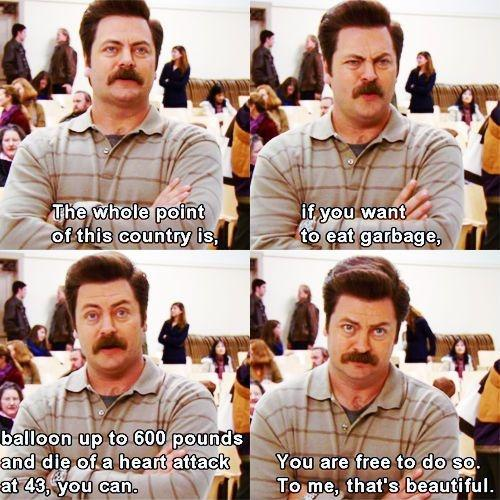There is a friend of someone close to me who I haven't connected with for many years. While we are on friendly terms, there was a reason I never tried to connect with her on Facebook, but recently she requested friendship there and I felt it rude to reject it. I was soon reminded why I always found her so draining.
The Victim
She's someone who takes a victim mentality and everything bad about her life and health is never her fault or within her control to change. A lot of resentment comes from her and is thrown at others. Doctors for not figuring out what's wrong and treating her, people offering to help her help herself (how dare they suggest she do something about what is obviously not her fault because she's sick, so she can't possibly do anything to change that). Selfish people for not understanding her or for being sick and going out in public, obviously to make her sick.

Image courtesy of @macfo.
The reality is that she is morbidly obese and her eating habits are appalling, but she has never taken ownership of that. She's now in her late 40s and it's taking its toll. Her digestive system is wrecked, she wants doctors to diagnose and cure it for her and she currently blames her weight on irritable bowel syndrome and hormonal imbalances (her self diagnoses will change depending on what best fits her defence at the time). I came across a post where she blamed these two things for the fact she's put on weight for the last 20 years, but I've known her for over 30 years and she was always morbidly obese. Her weight gain is nothing new. If you read through her posts she even accidentally admits that she's eating junk. She hasn't had a cooker to cook for herself for over a year, so she's currently eating fish and chips, for example. Yet if you suggest a change of eating habits she'll deny that she even eats badly.
The fighter
While I acknowledge that she's experienced trauma growing up and I know how much this can harm a person mentally, I also have another friend in her 50s who has been through trauma and she is the polar opposite of the younger woman. This friend has Lymes Disease, which is a chronic illness that the medical system knows very little about treating. She confessed to reaching a point in her life when she could barely string a sentence together. Yet when I met her she was slowly improving her health and has continued to do so. She rarely blames anyone for her problems, even when they are making problems for her and she owns the fact that she is the only one who can control what is going into her body and how active she chooses to be.
To me she's an inspiration, because despite days of fatigue and brain fog she'll be cooking and preparing meals, because there is little fast food available that she can eat without it knocking her flat on her back for days. On my bad days I wonder where she pulls that strength from to always be on the go. She had her youngest child at 42 years old, so she's still running around with all her schooling and activities.
Her philosophy is that when the pain gets bad enough, you do something about it. I sometimes forget that she had quite severe arthritis when we first met and that has actually gotten much better with her detoxing and diet changes.

Crawling out of the Victim Hole
I get that is not easy to help ourselves out of habits that are detrimental for us. Many don't because it's easier not to and just get medication to mask symptoms. Which is fine if that's your choice and I know plenty of people with victim mentalities who don't blame everyone and everything else for their problems. They might be exasperating as they complain about their ailments, but at least they don't blame others for their situation. Yet both of these examples are something I've been able to take inspiration from in their own ways. The victims being an example of how I don't want to be and the fighter being an example I'd like to follow.
A few years ago I started getting pain in my shoulder and upper arm and losing range of motion. It started on my right initially as shooting pains with broader reaching movements, but as long as I made those wider ranged movements slowly, I could do them without pain and gradually it went back to normal. Then it started on my left and just got worse. I reached a point where it wasn't just painful to make those wider ranged movements, my arm physically wouldn't move past a certain point. I couldn't even hold my arm up at the side of my head, making under arm shaving rather hard and painful to do.
My thinking for a long time had been that these things happen with age and there wasn't much you could do other than accept that you may no longer be able to do some of the things you used to. The chances are that they would gradually get worse as well. But by that point I'd heard too many stories of people had proven this concept wrong and I had started to learn that these things are actually more often caused by other connected and underlying issues. I know my posture is not the best and I wondered if that could be connected to the shoulder problems. So I started a multi-pronged approach of working in my upper back and neck posture, along with gentle stretching of my arms and shoulders.
We are often impatient and want to see results immediately, but when it comes to our bodies, problems caused by years of bad habits aren't going to be fixed in just days, so progress was slow and initially I didn't see any improvements. However, rushing things would only risk doing more harm than good. What kept me persisting at the start was the thought that improving my posture could only be a good thing, even if it didn't improve my shoulder problems. Then I saw small improvements and that encouraged me to keep going. It took months, but gradually it worked and by the time my daughter retired from gymnastics I was able to commence climbing with her, something I would never had been able to do if I hadn't been able to recover from that shoulder issue.
Recovering from the shoulder problem gave me a new confidence in my potential to improve myself. I went into climbing knowing that I would be the weakest among us (my daughter, my husband and I), but also aware that I wasn't young any more, so that was okay. Improvement would be slow, but as long as there was improvement and I was enjoying it, that didn't matter. I also realised that healing from injury would be much slower than when I was younger, so I knew I'd need to pace myself and not overdo it. Something my husband failed to do and ended up fracturing his wrist.
I think the biggest motivator for improving my physical health has been having goal I want to achieve. I'm not going to put myself through something I don't enjoy unless I can see it helping me to achieve something I do enjoy. For example, I don't like stretching; it's painful and it's hard to see any progress, especially as I get older and less supple. However, it is something that will help me advance my climbing technique, so I have found myself more willing to stretch when keeping that in mind. Certain stretches also help with my shoulder and back problems too, so it's a good side effect of doing it for something I enjoy.
Divider courtesy of @kaliphae



